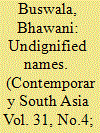| Srl | Item |
| 1 |
ID:
100075


|
|
|
|
|
| Publication |
2010.
|
| Summary/Abstract |
This article explores the phenomenon of military naming, that is, the act of giving a name to military practices such as military operations, weaponry, and military units. The basic theoretical supposition is that military naming is a simple and useful mechanism that might be employed to blur undesired aspects-such as the human and economical costs-associated with the respective practices. Inspired by John B. Thompson's ''strategies of operation of ideology,'' the research uses the construct of strategies of annihilative naming to analyze a corpus of 239 Israeli names of military operations and weaponry. By using names coming from nature and the Bible, the Israeli military uses three strategies-naturalization, euphemization, and legitimation-that mediate Israeli public opinion toward controversial military operations as well as weaponry development. Future research of other military names will support the construction of generalizations about this important phenomenon.
|
|
|
|
|
|
|
|
|
|
|
|
|
|
|
|
| 2 |
ID:
192860


|
|
|
|
|
| Summary/Abstract |
Focusing on the experiences of the marginalised castes in North India, this article examines the use of given names in intercommunity micro interactions and how it shapes the practices of everyday humiliation. With ethnographic data from Dalit activist discourses as well as everyday life in an urbanising village in Rajasthan, this article analyses how the upper castes tend to deform the given names of the members of the Dalit community to produce undignified names, and how the community claims their right to be addressed with appropriate names. I engage with the complexity of the formation and use of undignified names by analysing their function in shaping the local political field to regulate participation in the public sphere and how they are linked to valuable names in the production of social distinctions and their economic benefits. Taking names as an important symbolic object, this article foregrounds the politics of humiliations in everyday intercaste vyavahar to understand the micro dynamics of caste reproduction and how it is negotiated and contested.
|
|
|
|
|
|
|
|
|
|
|
|
|
|
|
|
| 3 |
ID:
152445


|
|
|
|
|
| Summary/Abstract |
In this article I assert that the importance of names within the process of racialisation has been under-explored in the UK context. I consider data from seven qualitative interviews, which suggest that names are racialised in the UK and that this racialisation can affect the naming choices of multiracial/ethnic parents. My participants indicated that, when choosing children’s forenames and surnames, there are juxtaposing concerns: a fear of potential discrimination faced by children on the basis of them bearing a ‘foreign’ name, and a desire to reflect the children’s multiracial and/or ethnic heritage. I describe and discuss two consequential strategies that my participants suggested: to give the child a white British name in an attempt to help them pass as white British, or to oppose the fears of racism/discrimination and give them a name that displays their Otherness. I discuss these ideas in relation to racial passing and whiteness literature.
|
|
|
|
|
|
|
|
|
|
|
|
|
|
|
|